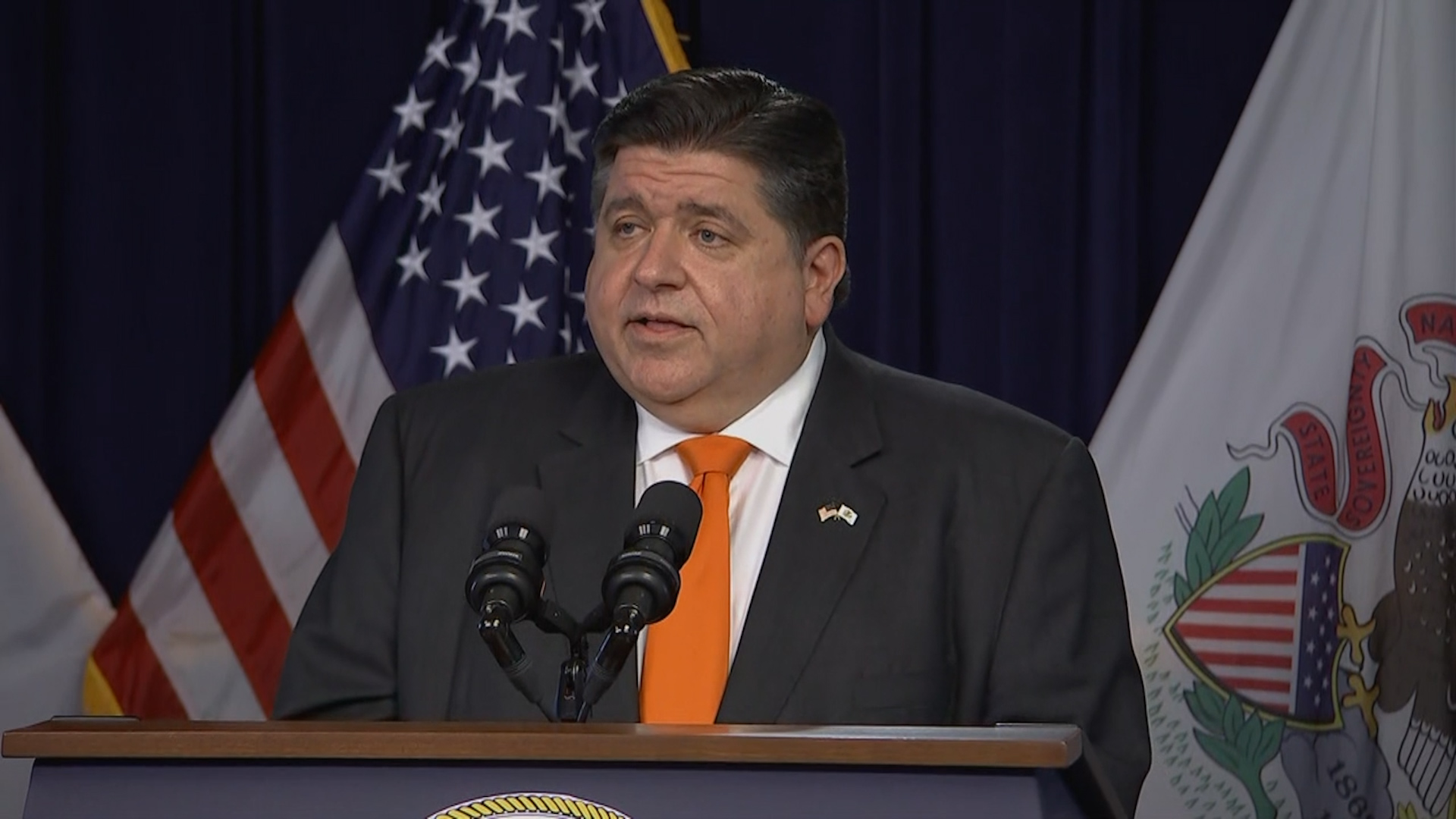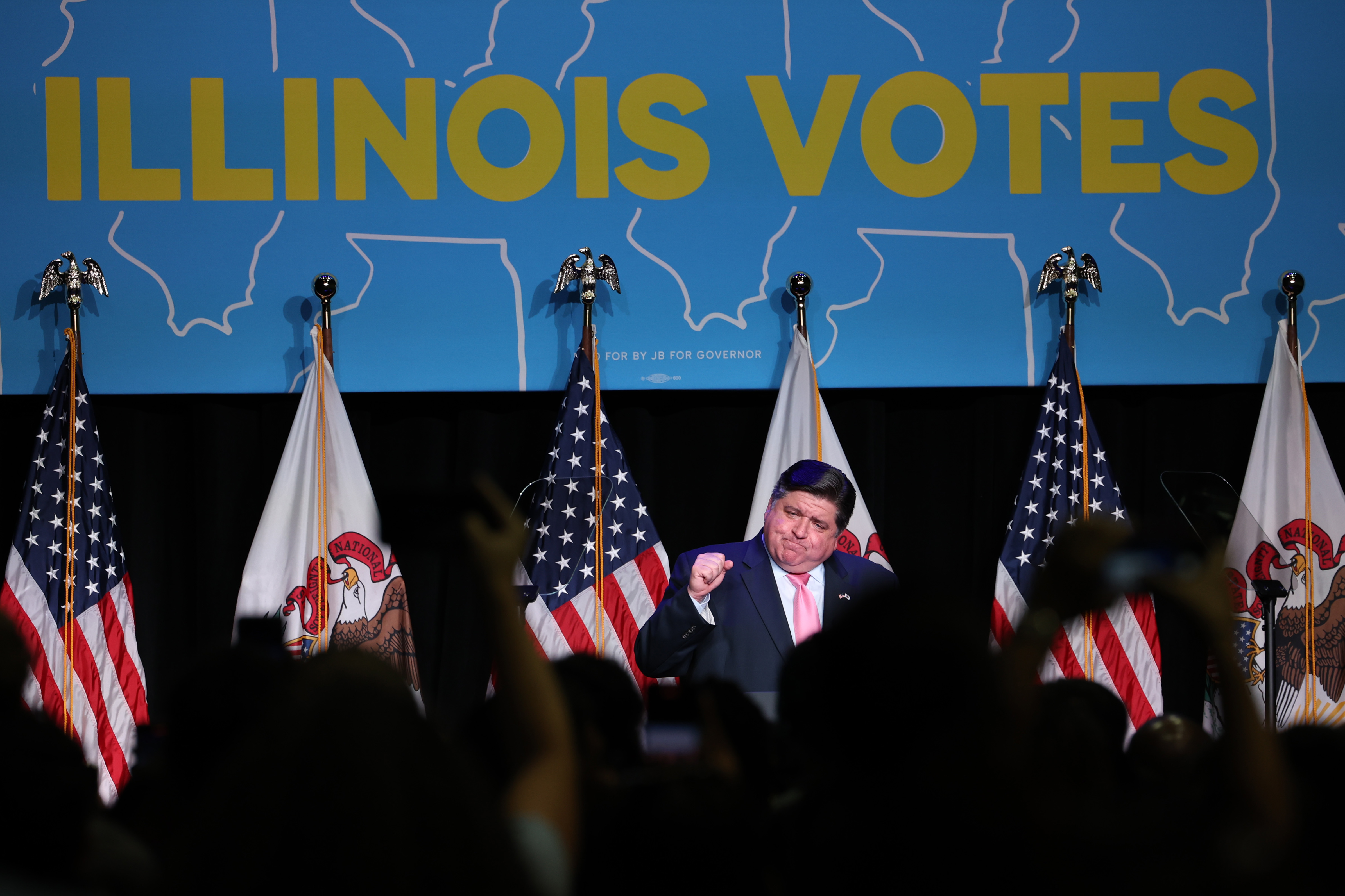As Illinois voters cast their ballots, the very first decision they’ll have to make is whether or not to support a constitutional amendment called the “Workers’ Rights Amendment.”
At the very top of the ballot this Election season in Illinois was a question asking voters to weigh in on an amendment to the state's constitution. It's Amendment 1 -- also known as the Workers' Rights Amendment.
The proposed amendment would essentially codify in the Illinois Constitution the right for employees to organize and bargain collectively over topics like "negotiating wages, hours, and working conditions, and to protect their economic welfare and safety at work."
A "yes" vote on Amendment 1 would also ban Illinois from passing any “right-to-work” laws, which state that employees cannot be forced to join a union or pay dues to a union.
As of 6:30 a.m. Wednesday, with 85% of precincts reporting, the race has still not been called, but votes in favor of the measure appear to be in the lead.
The measure would need 60% approval in order to pass and to amend the state’s constitution. You can track the live results of Amendment 1 and more here
What is the Workers' Rights Amendment?
The synopsis of the bill, as crafted by the General Assembly, reads:
"(The bill) Proposes to amend the Bill of Rights Article of the Illinois Constitution. Provides that employees shall have the fundamental right to organize and to bargain collectively through representatives of their own choosing for the purpose of negotiating wages, hours, and working conditions, and to protect their economic welfare and safety at work. Provides that no law shall be passed that interferes with, negates, or diminishes the right of employees to organize and bargain collectively over their wages, hours, and other terms and conditions of employment and work place safety, including any law or ordinance that prohibits the execution or application of agreements between employers and labor organizations that represent employees requiring membership in an organization as a condition of employment. Provides that these provisions are controlling over home rule powers.”
The amendment would specifically amend Article 1 of the state’s constitution, referred to in the synposis as the state's "Bill of Rights." That article essentially mirrors the Bill of Rights in the U.S. Constitution, while also providing protections in other areas as well, including prohibiting discrimination based on sex and discrimination based on physical or mental handicaps.
Feeling out of the loop? We'll catch you up on the Chicago news you need to know. Sign up for the weekly Chicago Catch-Up newsletter.
The amendment would also amend Article 7, which sets guidelines for powers given to local governments under “home rule” provisions in the constitution.
How Will Voters Know Whether the Amendment Passed or Failed?
The measure would need 60% approval in order to pass and to amend the state’s constitution.
Who Supports the Measure?
Labor groups representing both public and private workers have largely supported the measure, including the Chicago Teachers’ Union, the Illinois chapter of the AFL-CIO and the SEIU.
Illinois Democrats, including Gov. J.B. Pritzker, have also expressed support for the amendment.
“Worker safety and economic security is a fundamental right of all workers from domestic workers to PHDs,” said Illinois AFL-CIO President Tim Drea in a statement. “Everybody deserves a safe workplace and economic security.”
Joe Bowen, part of the “Vote Yes for Worker Rights” group that’s helping spearhead the push in favor of the amendment, told NBC Chicago that enshrining worker protections in the state constitution is critical due to attacks on those rights at both the state and national level.
“There’s never been a more important time for us to guarantee these projections in the Illinois constitution, because when you look at what’s happening nationally, our rights are under attack,” he said.
Bowen argues that the measure would add additional protections for employees in both the private and public sectors, and would ultimately result in better working conditions and better wages.
“Workers’ rights will put more money in the pockets of working Illinoisans, which will help those families and the communities where they live in,” he said.
Bowen says that the push by former Illinois Gov. Bruce Rauner to curtail the power of public unions serves as a reminder of why it’s critical to further bolster worker protections.
“It will also protect them from anti-worker politicians who would take those rights away in the future, and we’ve seen those anti-worker attacks in Illinois and at the national level,” he said.
Who Opposes the Measure?
Business groups, including the Chamber of Commerce and the Illinois Manufacturer’s Association, have voiced opposition to the measure, as has the Illinois Republican Party as a whole, though some GOP lawmakers have expressed support for the amendment.
The Chamber of Commerce’s President and CEO Todd Maisch argues that the measure would invest more political power into union leadership, and wouldn’t allow for the gains in income and job security that the amendment’s proponents have promised for workers.
The Illinois Policy Institute also argues that by giving more power to public unions, state residents would be impacted with higher property tax bills because of the extra advantages the amendment could potentially convey to unions in collective bargaining discussions.
Research conducted by the IPI argues that property tax bills could increase by a collective $2,100 over the next four years, though property tax rates have steadily increased in recent years, according to US Census Bureau data.
WirePoint’s Ted Dabrowski is part of a movement opposing the amendment, saying that it could potentially increase tax burdens on Illinoisans.
“The more powers you give the government unions to negotiate over taxpayers, the more it’s going to cost,” he told NBC Chicago.
It is the inability to tweak workers’ rights laws that groups like IPI and WirePoints have cited as evidence that it could lead to large salary increases for leadership in state unions, which they say would cause higher taxes and more headaches for taxpayers.
“Illinois won’t be able to become a ‘right-to-work’ state, as most of our neighboring states are, if it passes,” Dabrowski said.
What Chicago-Area Editorial Boards Say
On Oct. 10, the Chicago Tribune endorsed a "no" vote on Amendment 1, stating that a yes vote on the amendment would mean that "employers would be able to require workers to pay dues to unions as a condition of employment — something unions generally like because it can otherwise be challenging to collect those dues."
"Individual workers would not be able to choose whether or not they wanted to be a dues-paying member of a union if one was bargaining for them at their workplace," the endorsement continues. "That prohibition, potentially enshrined in the Illinois Constitution, conflicts with our rights as free Illinoisans to make those decisions for ourselves.
The editorial also states that the beneficiaries of the amendment are "public-sector employees," since federal law generally protects collective bargaining within the private sector." It also notes that the phrase "economic welfare" remains undefined, and "could mean all kinds of things."
"Unions should not be formulating general public policy at their headquarters," the editorial goes on to say. "That’s the sacred mandate voters give to elected officials. And secretive union bosses could also use the amendment to keep government contracts out of the way of prying reporters whose job it is to tell you how your money is being spent."
"Moreover, since the public sector also has to raise funds to cover its cost, the amendment seems likely to put pressure on property taxes and other sources of government revenues."
Similarly, the Daily Herald's "no" endorsement says the amendment is not needed. “The voters of 2022 ought not limit the rights of voters in 2072 or any other year to deal as they see fit with the challenges their era presents," it reads.
Crain's Chicago Business and Champaign's News-Gazette also ran "no" endorsements against Amendment 1.
In April of 2022, the Chicago Sun-Times said it was not endorsing any candidates or measures for the 2022 Illinois Midterm Elections.
What Changes if Amendment 1 Passes?
For all intents and purposes, the amendment will codify the right of workers to unionize into the state’s constitution.
It would also prohibit state government from passing “right-to-work” laws, which are currently in effect in at least 27 U.S. states.
According to Cornell Law, "a state that has a law prohibiting union security agreements is a so-called 'Right to Work' state."
Illinois has a long history of labor organizing with effects that reverberate nationwide, dating back to the 19th century Haymarket Affair and Pullman strike, both in Chicago. And as some states across the U.S. have passed right-to-work laws in recent years - prohibiting union membership or dues payment as a condition of employment - Illinois has again played a central role in that national conversation. Read more about the history of the proposed amendment here.
Amendment 1 would specifically add this language to Article I of the state constitution:
A – Employees shall have the fundamental right to organize and to bargain collectively through representatives of their own choosing for the purposes of negotiating wages, hours and working conditions, and to protect their economic welfare and safety at work. No law shall be passed that interferes with, negates or diminishes the right of employees to organize and bargain collectively over their wages, hours, and other terms and conditions of employment and to workplace safety, including any law or ordinance that prohibits the execution or application of agreements between employers and labor organizations that represent employees requiring membership in an organization as a condition of employment.
B – The provisions of this Section are controlling over those of Section 6 of Article VII.
How Will the Amendment Process Work?
The General Assembly passed the amendment in 2021, setting the stage for it to appear on the ballot in November 2022.
The next step is in the hands of the voters, and there are two ways that the amendment can become law in the state.
The first is if it receives three-fifths support from those who cast votes specifically on the amendment. If 1,000,000 residents vote, but only 500,000 cast ballots on the amendment, then it would need 300,000 votes to pass.
The other way involves the overall number of votes cast in the election. If 1,000,000 voters cast ballots, and all make choices on the amendment, then the measure would need a simple majority to pass and become law.
If either of those things occur, then it will become law quickly. Under the Illinois Constitution, the measure must be certified and declared adopted by the State Board of Elections within 20 days of the election.



